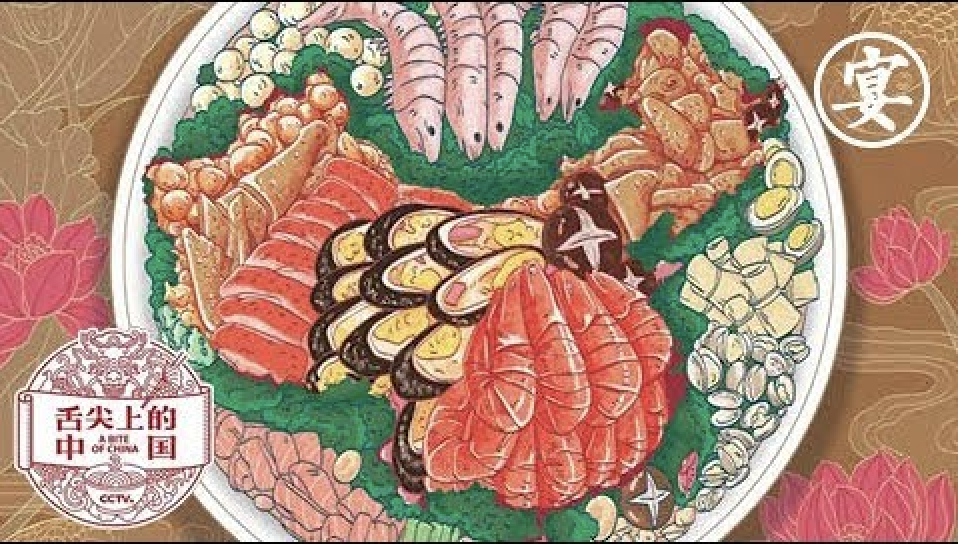A Bite of China (《舌尖上的中国》), directed by Chen Xiaoqing, is a documentary series that explores the rich culinary traditions of China, weaving together stories about food, culture, and history.

Food as More than Sustenance
One of the key themes in A Bite of China is the portrayal of food as much more than a means of sustenance. The series delves into the deep emotional and cultural connections people have with food. Each episode highlights how traditional Chinese cuisine is rooted in the land and in people’s daily lives. For example, the show often explores how local ingredients and techniques are passed down through generations, showing food as a symbol of heritage and continuity. In this way, the series does not just focus on the ingredients or cooking methods, but on how food serves as a bridge between past and present, linking families, communities, and even regions.
The Intersection of Food and Culture
Another significant aspect of A Bite of China is its focus on food as a reflection of Chinese culture. The documentary skillfully highlights how different cuisines across China’s vast and diverse landscape represent the unique geography, climate, and customs of each region. In one episode, the series explores the complexity of Sichuan cuisine, known for its bold, spicy flavors, and contrasts it with the delicate and subtle tastes of Cantonese dishes. By showcasing the diversity of regional food practices, A Bite of China emphasizes how food acts as a cultural identity marker, embodying the distinctiveness of various communities.
Through personal stories and regional specialties, the series shows that food is intimately tied to Chinese customs and traditions. Festivals, family gatherings, and ceremonies often center around particular dishes, reinforcing food’s role in the preservation of cultural practices. For example, the show explores how the preparation and sharing of certain foods during holidays like the Spring Festival (Chinese New Year) symbolize togetherness and familial love.
Historical Significance of Food
Beyond the contemporary cultural context, A Bite of China also traces the historical evolution of Chinese cuisine. The series highlights how the development of cooking techniques, agricultural practices, and food preservation methods has shaped the nation’s culinary heritage. Episodes often include historical anecdotes about the origin of specific dishes or ingredients, shedding light on how Chinese food has been influenced by centuries of migration, trade, and cultural exchange.
For instance, the documentary touches on ancient cooking methods such as fermentation and drying, which were used to preserve food in a time before refrigeration. The series also explains how China’s historical Silk Road brought foreign ingredients and flavors into Chinese kitchens, enriching the country’s culinary diversity. By doing so, A Bite of China effectively intertwines food with the broader historical narrative of China, illustrating the deep-rooted relationship between Chinese food and its social, economic, and political history.
Cinematic Storytelling
One of the most striking features of A Bite of China is its breathtaking cinematography, which transforms everyday food preparation into a visually captivating experience. Each episode is carefully crafted to highlight the beauty of Chinese landscapes, from terraced rice fields to bustling city markets, while emphasizing the artistry behind traditional cooking techniques. The slow-motion shots of chefs slicing vegetables or steaming dumplings serve to elevate simple, everyday acts into something extraordinary, giving viewers a sense of awe and reverence for the care and skill involved in making Chinese food.
Moreover, the documentary’s narrative style is intimate and personal, often following the lives of ordinary people—farmers, fishermen, and chefs—who are deeply connected to their culinary traditions. Through these individual stories, the show conveys a sense of nostalgia and pride for the cultural and familial heritage represented by food.
Conclusion
A Bite of China is much more than a documentary about Chinese cuisine; it is a celebration of the deep connections between food, culture, history, and identity. The series succeeds in showing how food transcends its role as a necessity and becomes a powerful symbol of belonging, memory, and tradition. By focusing on the stories behind the dishes and the people who prepare them, A Bite of China offers a thoughtful and poignant exploration of the ways in which food shapes and reflects Chinese society. Whether discussing the historical significance of a dish or the emotional bond it creates among family members, the series makes a compelling case for food as a vital part of cultural preservation and continuity in China.